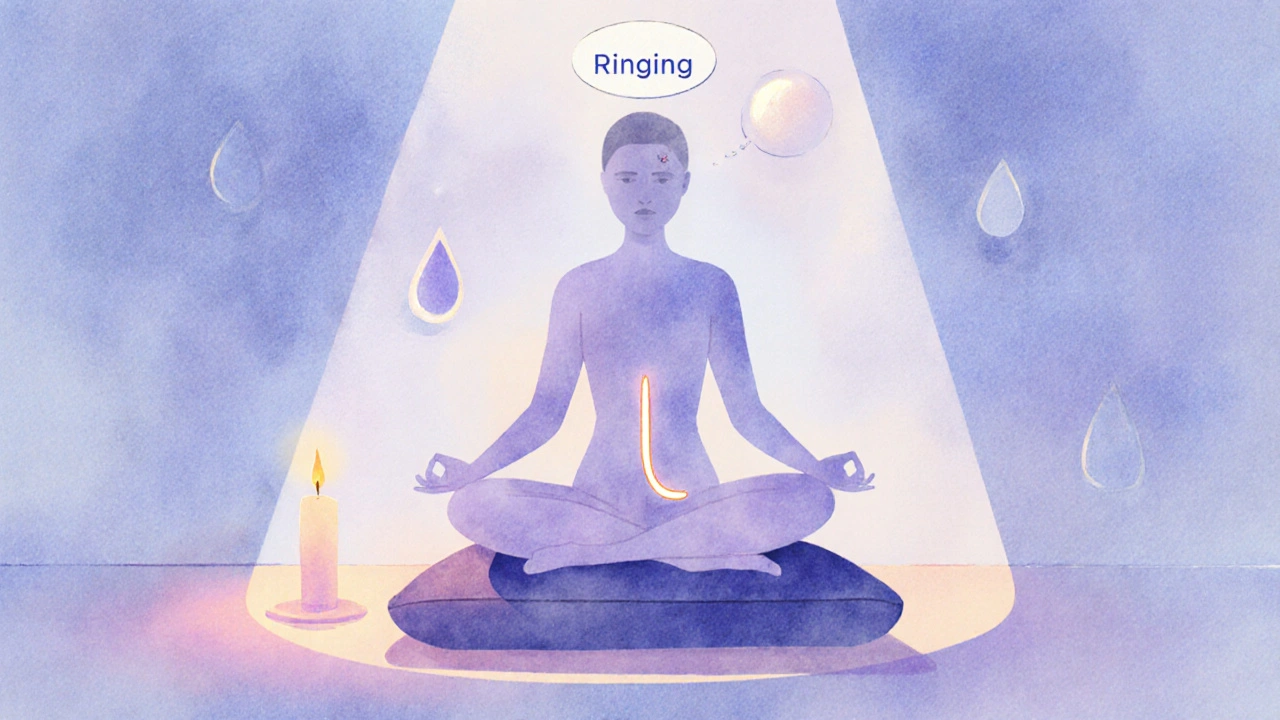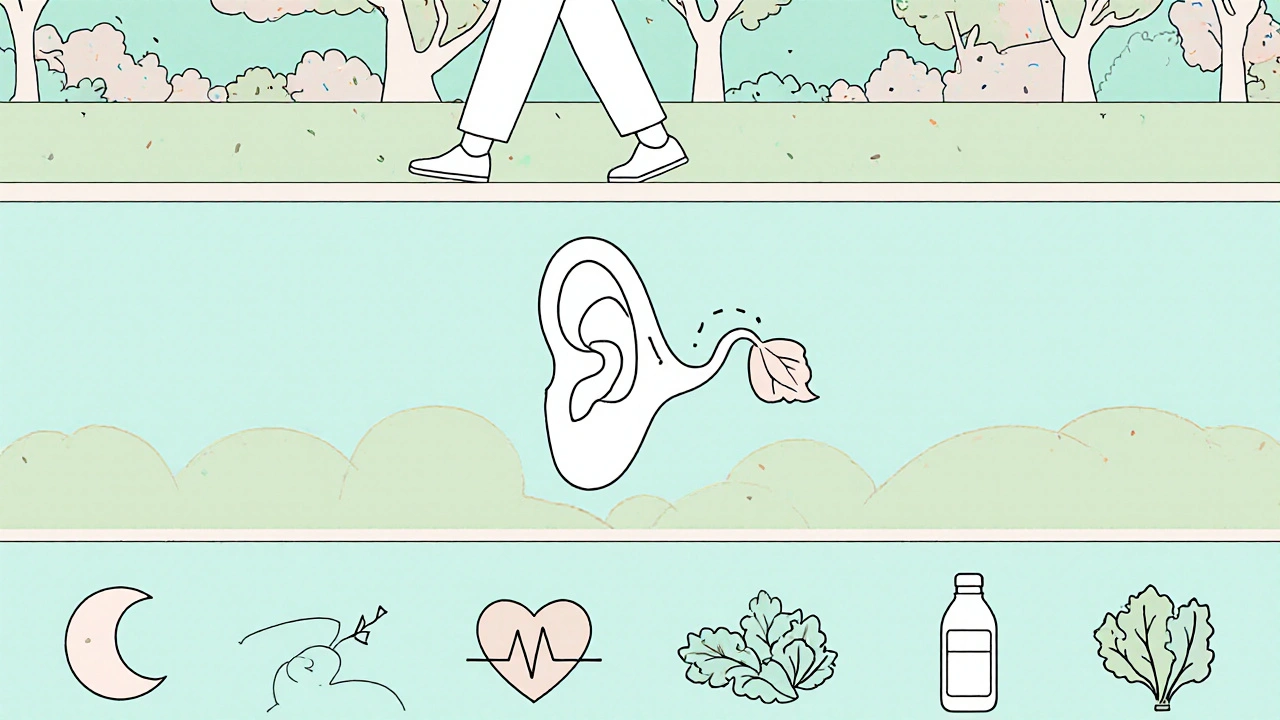Tinnitus Relief Tracker
Daily Practice Log
Progress Summary
No entries yet. Start logging your daily practice.
That persistent high‑pitched buzz in your ears can feel like an unwelcome soundtrack you can’t mute. While doctors often prescribe sound therapy or medication, many people discover that a calm mind can turn the volume down on the noise. Below you’ll learn how to use meditation and mindfulness to ease ringing, why they work, and which daily habits boost the effect.
Key Takeaways
- Understanding the brain‑sound loop behind tinnitus helps you target the right mental tools.
- Simple breath‑focused meditation can lower perceived ringing in as little as 10 minutes a day.
- Mindful listening exercises train the brain to re‑route attention away from the noise.
- Coupling mindfulness with better sleep, stress control, and blood‑pressure management amplifies benefits.
- Seek professional help if ringing worsens, is accompanied by dizziness, or affects daily functioning.
What Is Ringing in the Ears?
Tinnitus is the perception of sound-often a high‑frequency ringing, hissing, or buzzing-without an external source. It affects roughly 15% of adults worldwide, and prevalence rises with age, exposure to loud environments, and certain health conditions.
The brain’s auditory pathways keep firing even when there’s no sound, creating the phantom noise. Stress, poor sleep, and high blood pressure can amplify this signal, making it feel louder and more intrusive.
Why Meditation Helps Tinnitus
Stress is a major amplifier of tinnitus. When you’re anxious, the body releases cortisol and adrenaline, which tighten blood vessels and heighten neural activity in the auditory cortex. This "stress‑ringing" loop makes the buzz seem louder.
Meditation a mental practice that trains attention and reduces physiological stress responses interrupts that loop by lowering cortisol, slowing heart rate, and teaching the brain to shift focus away from the unwanted sound.
Over time, regular meditation reshapes neural pathways-a process called neuroplasticity-so the brain learns to treat tinnitus as background noise rather than a foreground alarm.

Basic Meditation Practices for Tinnitus
Start with a short, repeatable routine. Consistency beats intensity when you’re new to meditation.
- Set the stage: Find a quiet room, dim the lights, and sit comfortably with a straight spine.
- Focus on breath: Inhale through the nose for a count of four, hold for two, exhale through the mouth for six. Keep your attention on the rising and falling of the abdomen.
- Notice the ringing: When the ear buzz enters awareness, label it-"ringing"-and gently return to the breath. This labeling creates a mental distance.
- Body scan: After five minutes, shift attention slowly from the toes to the crown, noticing any tension. Release tightness with each exhale.
- End with gratitude: Finish by silently naming three things you appreciate that day. This positive closure reduces lingering stress.
Do this routine once or twice daily for at least two weeks. Many users report a 20‑30% drop in perceived loudness within the first month.
Mindfulness Exercises to Reduce Ringing
Mindfulness expands the breath practice by bringing non‑judgmental awareness to everyday moments, especially listening.
- Mindful Listening: Choose a gentle sound-like a ticking clock or distant rain. Close your eyes and focus solely on that sound. When the tinnitus intrudes, note it without reacting, then return to the chosen sound. This trains the auditory system to prioritize external inputs.
- 5‑Senses Scan: While seated, spend 30 seconds deliberately observing each of the five senses. When the ears dominate, acknowledge the sensation and move the focus to another sense. The practice weakens the brain’s habit of over‑weighting auditory input.
- Walking Meditation: Walk slowly, feeling each footfall. Align your breath with steps-inhale for three steps, exhale for three. The gentle movement adds proprioceptive input, helping the brain re‑balance sensory processing.
Integrate these exercises during moments of heightened ringing, such as after a noisy commute or before bedtime.
Lifestyle Tweaks That Complement Mindfulness
Mindfulness works best when the body’s baseline stressors are low.
Sleep quality duration and depth of restorative rest is crucial; poor sleep spikes cortisol and makes tinnitus feel louder. Aim for 7-9 hours, keep the bedroom cool, and avoid screens at least an hour before bed.
Elevated blood pressure the force of blood against artery walls can intensify the ringing. Regular aerobic activity-like brisk walking, cycling, or swimming-helps keep it in check.
Noise exposure is a big trigger. Use earplugs at concerts, keep personal music volume below 60% of maximum, and give your ears quiet breaks throughout the day.
Hydration and a balanced diet rich in magnesium (nuts, leafy greens) and omega‑3 fatty acids (fatty fish) support nerve health and may lessen tinnitus severity.

When to Seek Professional Help
Mindfulness isn’t a cure‑all. If you notice any of the following, book an appointment with an audiologist or ENT specialist:
- Sudden onset of ringing or a dramatic increase in volume.
- Accompanying dizziness, vertigo, or hearing loss.
- Persistent ringing that interferes with work, sleep, or relationships despite consistent mindfulness practice.
- History of head injury or exposure to ototoxic medications.
Professional assessment may reveal treatable underlying causes, such as earwax blockage, Menière’s disease, or vascular issues.
Comparing Non‑Pharmacological Approaches
| Approach | Primary Mechanism | Typical Time to Notice Benefit | Best For |
|---|---|---|---|
| Mindful Meditation | Reduces stress hormones; trains attention away from sound | 2-4 weeks | People with stress‑related amplification |
| Sound Therapy (white noise, nature sounds) | Masks phantom noise, provides external auditory input | Immediate to few days | Those who find silence uncomfortable |
| Cognitive Behavioral Therapy (CBT) | Alters negative thought patterns about tinnitus | 4-6 weeks | Individuals with anxiety or depression linked to tinnitus |
| Physical Exercise | Improves circulation, lowers blood pressure | 3-6 weeks | Those with cardiovascular risk factors |
Most experts recommend a blended approach-combine meditation with sound therapy or CBT for maximum relief.
Quick Checklist to Start Your Mindful Tinnitus Routine
- Set aside 10-15 minutes twice daily for breath‑focused meditation.
- Choose one mindfulness exercise (e.g., mindful listening) to practice when ringing spikes.
- Track sleep, stress levels, and perceived ringing intensity in a simple journal.
- Incorporate 30 minutes of moderate aerobic activity at least three times a week.
- Limit headphone volume and wear ear protection in loud settings.
- Review your journal after two weeks; adjust practice length or add sound therapy if needed.
Frequently Asked Questions
Can meditation completely eliminate tinnitus?
Meditation rarely removes the sound entirely, but it can lower the perceived volume and distress in many people. Success depends on consistency, stress levels, and any underlying medical issues.
How long should I practice each session?
Start with 5-10 minutes and gradually increase to 15-20 minutes as comfort grows. Even short, regular sessions outperform occasional long ones.
Do I need a special app for mindfulness?
No, a simple timer or a quiet space works fine. Many free apps offer guided meditations that can help beginners stay on track, but they’re optional.
What if the ringing gets louder during meditation?
That’s common early on. Acknowledge the increase without judgment, return focus to the breath, and note the change in your journal. Over time, the episodes usually diminish.
Should I combine meditation with medication?
If a doctor has prescribed medication, continue it unless advised otherwise. Meditation can complement treatment, often allowing lower doses after a few weeks of practice.






Angelo Truglio
October 14, 2025 AT 21:38We are drowning in a relentless symphony of high‑pitched agony!!! The very fabric of our daily routine is being shredded by the invisible tyrant that is tinnitus!!! Yet, amidst this chaos, we have the audacity to ignore the simplest, most potent antidote-stillness of the mind!!! If we continue to chase quick fixes, we betray our own responsibility for healing!!! The path to relief is not paved with pills alone, but with a disciplined practice of mindfulness that demands our unwavering commitment!!!
Dawn Midnight
October 26, 2025 AT 10:24The evidence presented aligns with current research, but the article could benefit from citing specific studies on neuroplastic changes induced by meditation. Including quantitative data would strengthen the argument and provide readers with measurable expectations.
frank hofman
November 7, 2025 AT 00:11lol i dun think meditation is some magic wand, but hey if it calms ur brain maybe it helps the buzz 😜 i guess it’s worth a try, not like u’re losing anything 😏
ayan majumdar
November 18, 2025 AT 13:58Sure try it and see if it changes anything
Johnpaul Chukwuebuka
November 30, 2025 AT 03:44Friends, give your ears a break and your mind a calm place. Simple breath work can lower that ring and help you sleep better. Start with five minutes each morning, note the change and keep going. You will feel stronger and more peaceful.
Xavier Hernandez
December 11, 2025 AT 17:31It is a disgrace that we allow stress to dominate our inner soundscape, when the humble practice of meditation can gently hush the clamor. Let us rise above our frantic habits and pledge to honor the silence that our bodies crave, for only then can we claim true mastery over the phantom hum.
Angel Gallegos
December 23, 2025 AT 07:18Honestly, the article reads like a reheated self‑help brochure; the suggestions lack depth and the so‑called “mindfulness techniques” are presented without any rigorous scientific backing. A more critical examination would have exposed the superficiality of these practices.
Michael AM
January 3, 2026 AT 21:04I get where you’re coming from but the basics are solid – breathing and body scans do reduce stress which in turn eases tinnitus. Keep at it and you’ll notice a shift.
Rakesh Manchanda
January 15, 2026 AT 10:51My dear interlocutor, while the exposition above offers a commendable overview, one must also consider integrating adaptive sound therapy alongside meditation to create a synergistic effect that truly silences the intrusive ringing.
Erwin-Johannes Huber
January 27, 2026 AT 00:38Excellent point! Combining both approaches often yields the best results – stay consistent and trust the gradual progress.
Tim Moore
February 7, 2026 AT 14:24It is a pleasure to engage with the comprehensive overview presented herein concerning the application of meditation and mindfulness to the management of tinnitus. The author has adeptly summarized the neurophysiological underpinnings of the condition, notably the maladaptive auditory cortical activity that persists in the absence of external stimuli. Moreover, the discussion of stress as an amplifying factor aligns with the extant literature on hypothalamic‑pituitary‑adrenal axis involvement. The proposed breath‑focused meditation protocol is sound, as diaphragmatic breathing has been demonstrated to attenuate sympathetic arousal. Nevertheless, a more detailed description of session frequency and progression would enhance reproducibility for the lay practitioner. The inclusion of a body‑scan component is commendable, given its capacity to promote interoceptive awareness and reduce somatic tension. It would be prudent, however, to advise readers on the optimal duration of each segment to prevent cognitive overload. In addition, the mindful listening exercise is a valuable adjunct, yet the recommendation should be accompanied by guidance on selecting appropriate ambient sounds. The lifestyle modifications enumerated, such as sleep hygiene and cardiovascular health, are integral to a holistic management plan. One might consider expanding upon nutritional considerations, specifically the role of magnesium and omega‑3 fatty acids, which have been implicated in neural health. The tabular comparison of non‑pharmacological interventions offers a clear visual synthesis, though citation of primary sources would bolster credibility. It is also important to address potential contraindications for individuals with comorbid psychiatric conditions, as meditation can occasionally exacerbate anxiety in susceptible persons. The author’s emphasis on tracking progress via a journal is laudable, as self‑monitoring facilitates adaptive adjustments to the regimen. Future research directions could explore longitudinal outcomes of combined mindfulness and acoustic therapy, thereby filling an existing gap in the evidence base. In sum, the article provides a solid foundation for individuals seeking self‑guided strategies, while also highlighting avenues for further refinement and scholarly inquiry.
Erica Ardali
February 19, 2026 AT 04:11In the quiet of the mind, the endless ring becomes a metaphor for the ceaseless chatter of the soul; only through disciplined silence can we transcend the illusion of sound and grasp the true nature of being.